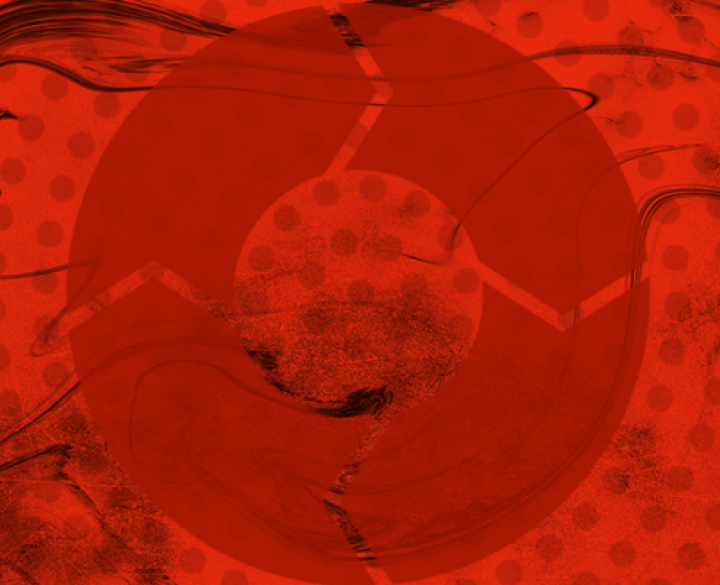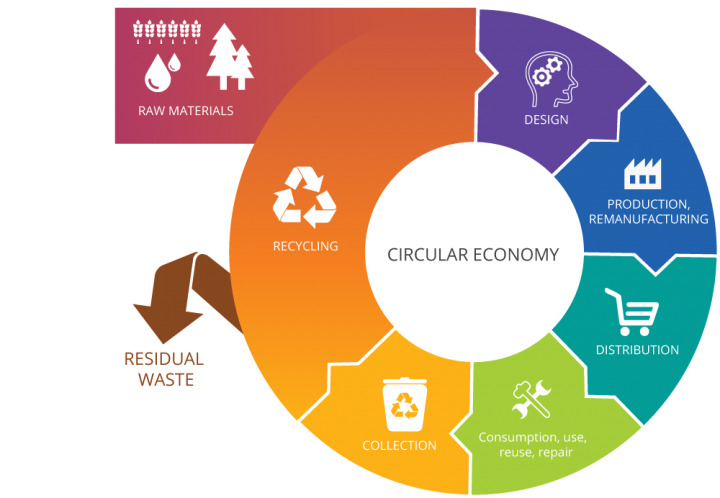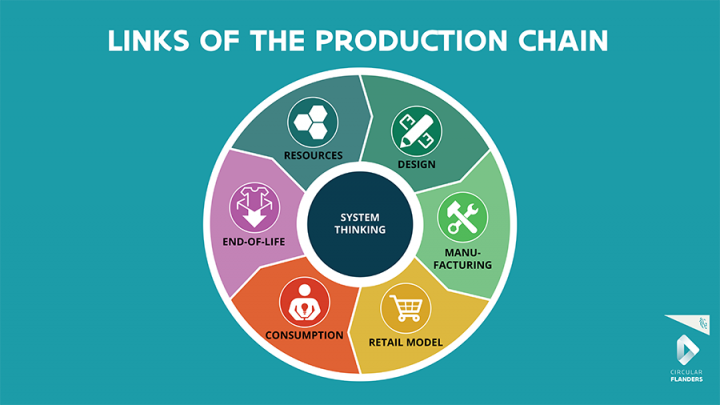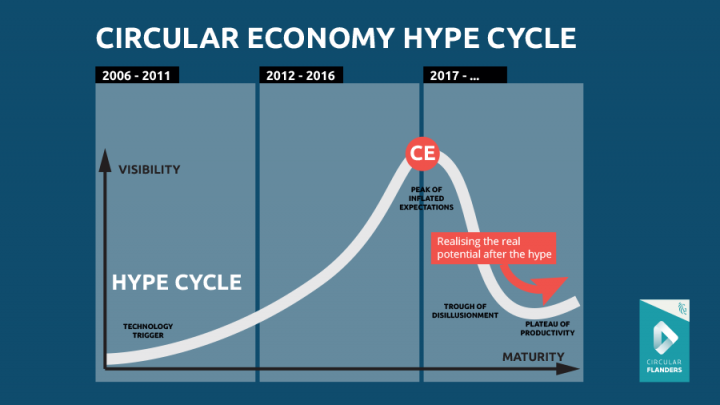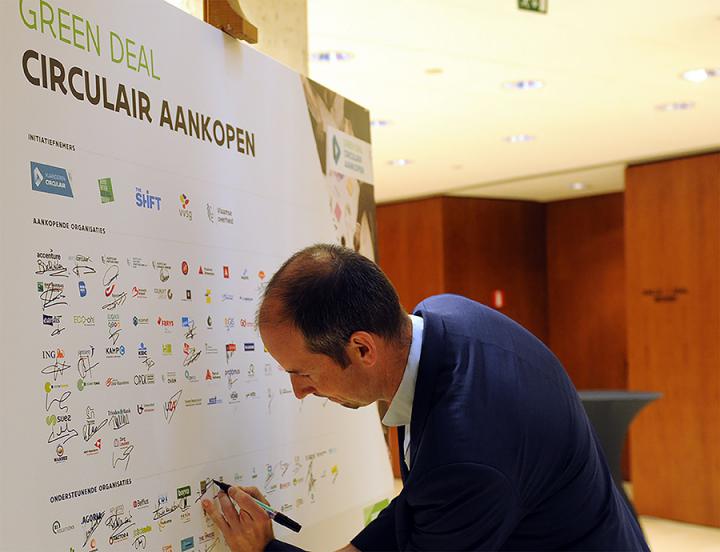The circular economy is a model of production and consumption, which involves sharing, leasing, reusing, repairing, refurbishing and recycling existing materials and products as long as possible. In this way, the life cycle of products is extended.
In practice, it implies reducing waste to a minimum. When a product reaches the end of its life, its materials are kept within the economy wherever possible. These can be productively used again and again, thereby creating further value.
This is a departure from the traditional, linear economic model, which is based on a take-make-consume-throw away pattern. This model relies on large quantities of cheap, easily accessible materials and energy. Also part of this model is planned obsolescence, when a product has been designed to have a limited lifespan to encourage consumers to buy it again.
Europe
Circular economy action plan
The EU’s new circular action plan paves the way for a cleaner and more competitive Europe.
The European Commission adopted the new circular economy action plan (CEAP) in March 2020. It is one of the main building blocks of the European Green Deal, Europe’s new agenda for sustainable growth. The EU’s transition to a circular economy will reduce pressure on natural resources and will create sustainable growth and jobs. It is also a prerequisite to achieve the EU’s 2050 climate neutrality target and to halt biodiversity loss.
Flanders
Vlaanderen Circulair
Vlaanderen Circulair is the junction and source of inspiration for the circular economy in Flanders (Belgium). It is a partnership uniting the actions of governments, companies, civil society and science.
Wallonia
Circular Wallonia
Circular Wallonia engages important levers to deploy the circular economy in order to contribute to the recovery of the economy and the implementation of a more sustainable economy. This dynamic will allow Wallonia to improve its resilience, by fully integrating the change of course imposed in particular by climate change, as well as by ensuring greater independence in terms of resources and in relation to global supply chains.
Being the sectoral expert, Centexbel has been assigned Taskforce group leader to coordinate the actions within the textile value chain.
Services to the industry
- Information sessions
- Learning Network "Sustainable business models"
- Advice on sustainability and recycling
- Testing
- Prototyping
Standardization
The standards cell "Circular economy and durability" is at the service of all companies having a direct interest in developments in the field of recycled polymers
Research dedicated to the circular economy
Centexbel-VKC initiates, manages and/or participates in a whole series of research projects related to the creation and promotion of a ciruclar economy.
You can quickly obtain an overview of all relevant R&D projects in our list by selecting "circular economy" in the competence selection box.

Centexbel is partner in the Circular Materials Center, the research and training center for the plastics and textiles sector that is created to support and encourage companies to do circular business by giving them access to expertise, machinery and training at the Circular Materials Center.
What is a circular economy?
In a circular economy, the value of products and materials is maintained for as long as possible. Waste and resource use are minimised, and when a product reaches the end of its life, it is used again to create further value. This can bring major economic benefits, contributing to innovation, growth and job creation.
A circular economy encourages sustainability and competitiveness in the long term. It can also help to:
- preserve resources – including some which are increasingly scarce, or subject to price fluctuation
- save costs for European industries
- unlock new business opportunities
- build a new generation of innovative, resource-efficient European businesses – making and exporting clean products and services around the globe
- create local low and high‐skilled jobs
- create opportunities for social integration and cohesion
What is needed to bring about a circular economy?
- Better product design is key to facilitating recycling and helping to make products that are easier to repair or more durable, thus saving precious resources.
- Production processes can be improved to use resources more efficiently and to produce less waste, increasing the competitiveness of European industry.
- The choices made by millions of consumers can support or hamper the circular economy, and are shaped by:
- the information that consumers have access to
- the range and prices of existing products
- the regulatory framework
- Secondary raw materials still account for only a small proportion of materials used in the EU (around 10 % in total). There are important barriers to their uptake in the economy, for example due to inadequate collection systems or the uncertainty of their sources, composition, quantity and quality.
-
Research and innovation are key to enabling the transition to a circular economy and to boost the competitiveness of EU industry. Public and private investments are necessary to make it happen. Horizon 2020, COSME, the Structural and Investment Funds, the Fund for Strategic Investments and other EU programmes are important support instruments at the EU level. SMEs, including social enterprises, are particularly active in fields such as recycling, repair and innovation. They play an important role in the development of a more circular economy.
Plastics in a circular economy
Plastic is a key enabling material in many industrial and consumer applications thanks to an innovative EU plastics industry. The benefits plastics bring to our society and economy are undeniable. However, the value of plastics is lost due to an inadequate and insufficient plastic waste management (less than 30% of plastic waste generated is recycled). Littering and leakage in the environment are also causing negative impacts on land and sea life.
The transition to more circular plastics and plastics value chain is an opportunity for the EU society and economy. This is the new vision set in the plastics strategy in line with its industrial policy strategy and also providing a tangible contribution to the implementation of the 2030 Sustainable Development Goals and the Paris Agreement.
The EU Plastics Strategy sets a list of actions to be taken at different levels (local, national, European and international) that will improve the economics and quality of plastic recycling, increase the trust in recycled plastics and boost the market, curb plastic waste and litter and drive investments and innovation.
Centexbel-VKC's actions in support of a circular economy
Signing of the Green Deal "Circular purchasing"
Flanders has initiated the Green Deal, a voluntary deal between (private) partners and the Flemish authorities to start up a common green project. The environmental goals go hand in hand with a higher level of competion and good managment. The deal clearly includes a role distribution, a description of the expected results and the related actions and time schedule.
The projects makes use of the dynamics, creativity and knowledge within the sociey to cope with these social-environmental challenges.
On June 8, 2017 the kick-off of the “Green Deal Circulair Aankopen” took place, a new Flemish initiative of Vlaanderen Circulair. Stijn Devaere, director services signed the Green Deal on behalf of Centexbel. Our centre will support the objectives of the Green Deal by organising at least two actions in support of the participants and the training network by means of training sessions, consultancy, tool development, research, examples of requirements, communication, etc.).
QA-CER certification system of recyclates
In collaboration with BQA (Belgian Quality Association) Centexbel-VKC has developed a three-level certification programme for recycled materials.
QA-CER assures the quality system related to the recycling process and use of recycled materials. Both the recycled content and the quality of the end product are addressed in order to support the principle of sustainability.




